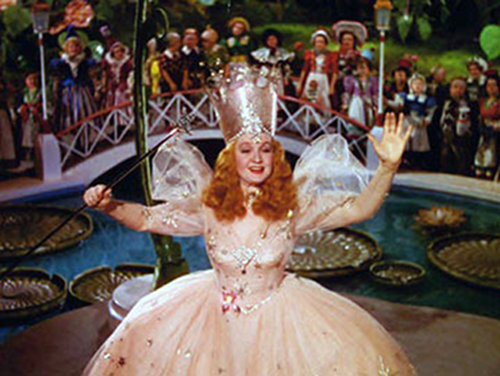The following originally appeared on Erowid.
“Come out, come out wherever you are…” The Good Witch of the North sings that song in the Wizard of Oz to encourage the Munchkin folk to quit hiding in the bushes and to come investigate a welcome change in local affairs. It’s the mantra chanted by children everywhere when the game is finally over, and it’s time to stop fooling around and go home.
Coming out: Like a hungry snail sticking its soft wet vulnerable head out from under the rim of its shell and beginning the long dangerous journey to the garden feast. Coming out: Like the gunman at the end of a stand-off, hands raised and conspicuously empty, finally ready to face the cacophony because the alternatives sound even worse. Coming out: like the stars at night, which were there all along in the daytime, too, but invisible until forced into sharp relief by the gathering darkness.
As a married woman who is both bisexual and polyamorous, I’ve had quite a few tough questions to answer over the years. When my husband and I started dating our mutual girlfriend, it took me a long time to tell certain people about it. In fact, I only just told one dear friend last week—and we’re fast approaching our fourth anniversary as a triad. The excuse is that my friend lives in Australia, and I like to talk about such things in person. Partly it’s that I was nervous, though. Not all of my conversations about the matter have been entirely pleasant, and certain people’s disapproval has the potential to weigh heavily upon me, sometimes so much so that when they really think I’m botching it all up, I’m inclined to doubt my own judgment. There are some important people, mostly older family members, whom I still haven’t told and I probably never will tell. (If you’re one of them—surprise!—and I’m sorry, and yeah I also write about drugs on the Internet. Call me and we can talk about it. Ahem.)
Similarly, for a long while I was only “out” about my use of psychedelics to a small handful of fellow explorers. After a while my mom found out. I can’t remember if I told her or if I got caught or what, but she was surprisingly cool about it. I probably didn’t go into much detail about the particulars of my practice at the time, because I didn’t want to freak her out or get into too much trouble. (I was a dumb kid and Erowid wasn’t around to consult about dosage, interactions, or harm reduction strategies, so I tended to sort of wing it. Results varied, as you might imagine.) Eventually I told my brother what I’d been up to, and shared some acid with him, which turned out to be one of the best trips ever. Next I started talking about my habits at social events, awkwardly at first and then more casually when the sky failed to fall. Lots of people had questions, and I got plenty of opportunities to dispel myths and to educate people. Eventually I started tripsitting, and people I had barely met started inviting me to their upcoming expeditions. The word was out about me, and as far as I was concerned that was just fine.
Then I got the opportunity to start writing for Erowid. At first I was elated! The more I thought about it, though, the more concerns begin to creep into my mind. This is for reals, I thought. This is on the Record. Sure, I don’t have to use my legal name, but it wouldn’t exactly take Sherlock Holmes to track me down. I wondered: Is it illegal to just talk about it? I mean Obama isn’t in jail for admitting to having indulged his youthful curiosity, right? What if I want to emigrate one day, or get into some kind of cool program or something, and my public connection with such a taboo subject counts against me? It seems unlikely right now, but life is long and the Internet is forever. Could I get busted for something like promoting terrorist activity under the Patriot Act or whatever? What if an extremely conservative regime comes into power some day and decides to round up all the troublemakers? I’d normally shrug off that kind of ideation (paranoia will destroy ya), but this time it really got to me. Sometimes it still does. I just had to do it, though. I’d end up kicking myself forever if I passed up the chance to contribute to my favorite website out of cowardice.
And then came the big one. See, I recently did something really stupid. Or maybe it was super cool. In any event it blew the closet door off of its hinges and shattered it to smithereens. A well known production company got in touch with me and told me that they were making an open-minded documentary about psychedelics that had all kinds of cool people whom I admire and respect attached to it and so forth, and asked me very nicely if I would possibly consider letting them tag along the next time I happened to be planning on taking something, anyway. (They were scrupulously careful not to suggest that I do anything just for their benefit.) The vision was to follow me around at some sort of festival, and capture a colorful glimpse of psychedelic sparkle to liven up what was essentially a fascinating but rather dry talking heads piece.
Well. I had just finished writing that column about records (Are We Recording? ) and why it was extremely sketchy indeed to so much as make a secret video of yourself tripping in the privacy of your own home, and now here was this strange request. I meditated upon it for several days. Literally millions of people would see this. Some of them might be friends and relatives who would be shocked (shocked!) to see their beloved Faerie both breaking the law and ruining her once brilliant mind. Could I be prosecuted even if nobody ever saw me take the drug and it was just implied that I had done it? Worse yet: What if I made a fool of myself and, by extension, brought shame and dishonor upon the psychedelic community at large? I look like a freak, for one thing. I’m not representative of anyone; I’m sure as hell not the poster child for psychedelic culture, and I have no desire to be. There’s no such thing as psychedelic culture, anyway. It looks as much like a therapy session, or like your dentist and your accountant sitting around the living room with goofy grins on their faces, as it looks like a rave, or like a concert scene.
In the end I accepted it. The fact was that they were going to find somebody who would do it eventually, and I didn’t have anyone to recommend to them that I trusted more than myself and Seuss Dean, who is always willing to share both my honor and my peril. I told them that I wasn’t comfortable with the hedonistic festival idea, though, and suggested that they come record our actual practice instead. All and all I think it went pretty well. I feel confident, at least, that it was better than the festival thing would have been if I’d let the cup pass from me.
But now I’m waking up in the middle of the night in cold sweats. The cat is out of the bag and on the loose, shredding up the furniture and pissing on the rug. I keep thinking of more and more people who might see that documentary, like for instance my mother-in-law. I keep wondering what clips they’ll use; some of the stuff that I said I’m really proud of and some of it was silly, but even if I’d done a perfect job they could surely cut it to make us look like assholes if they wanted to. I’m statistically certain that it will come back to haunt me again and again, sometimes in amusing ways, sometimes maybe not so much so. Whatever. It’s out of my hands now. The point is that I’m feeling it, okay?
And it is from the nauseating pinnacle of this state of extreme overexposure that I want to talk to you about coming out.
One of the things I told the documentary crew was that if even five percent of the people who use psychedelics would admit it, the entire landscape of the debate would be radically altered. Social outliers like myself tend to be the first demographic to step into the light, perhaps because we have less to lose than, say, teachers and police officers. It’s unfortunate though, because that gives the straights the impression that psychedelic users tend to be fringe dwellers. The same thing happened in the gay community. When I was a kid it was largely portrayed as a freak subculture because the freak subculture was its most visible and vocal manifestation. It wasn’t until good solid Joe Average Citizens—bankers and bakers, respected authors and politicians, parents, educators, doctors and members of the clergy—started standing up to be counted that society at large was forced to re-examine its prejudices. I don’t think that the solution to this is to silence the committed minority. Rather, I think the large majority of quiet and respectable users need to be encouraged to speak out about their practice and politics, their convictions and their experiences.
Not all users share the same agenda, obviously. Political and social stances vary both widely and sharply. Some people would simply like to see restrictions relaxed on scientific research, whilst others want to legalize everything and let natural selection sort it out. Most people fall somewhere in between. There is no official party line here. You have to examine the issues and decide for yourself what you stand for, how much it means to you, and how far you’re willing to go. All I’m asking is that you take the time to assess the potential risks and rewards of sharing your opinions on the matter, whatever they may be. Many of you will find that it’s really not worth it, and if I were in your shoes I might well come to the same conclusion. For instance if you’re a junior high school teacher or you foresee a custody battle in your future, speaking out about cognitive liberty issues might not be a wise decision. Your energies may be badly needed elsewhere, and you can’t afford the risk or the time. Your family, friends, church, school, or co-workers might be so anomalously intolerant that you’d turn your life into a living hell if you came out. Maybe it’s just super personal to you and you don’t think it’s anybody else’s damn business. All of this is perfectly legit. I’m just asking you to think about it.
My own position kind of waffles, but I suppose I ought to lay my cards down if I want to inspire anyone else to do the same. I do think people should have the right to experiment with various research chemicals, assuming that the situation can be brought sufficiently above-ground to guarantee materials of known quality and dosage. For sure the actual bleeping researchers ought to be allowed to explore them! And there’s got to be some system in place for therapeutic access to empathogens. Frankly, I don’t think it’s Uncle Sam’s business what adults decide to put into their bodies. I feel pretty strongly about that in principle. On the other hand nobody with any common sense wants to see heroin vending machines on the local street corner, so there’s a conundrum. I feel pretty good about supporting the decriminalization of psychedelic plants, because while it doesn’t go far enough it also doesn’t go too far, if you see what I mean, and it seems like a just barely plausible goal; whereas the blanket legalization of all psychoactive medicines strikes me as neither attainable nor wholly desirable at present. Let’s call it a starting place. It’s somewhere to stand. (Now if I only had a long enough lever…)
For me the prohibition of psychedelic plants is a civil and human rights issue of the first order. Fundamental principles are at stake. Who will make important decisions about our bodies and our minds? From what perspectives shall we be allowed to see ourselves, and through what lenses may we look out upon what we are pleased to call our shared reality? These are huge questions, and they’re only going to get bigger faster as emerging technologies and advancing research put ever more fascinating tools into our hands.
It’s also a religious freedoms issue. The U.S. Constitution guarantees all citizens the right to address metaphysical matters as they see fit, and according to my interpretation that ought to include the right to alter one’s consciousness with psychedelic plants. In fact, I believe that access to our own souls is an inalienable right, regardless of what the Constitution has to say. The association of psychedelic plants with religious and spiritual motifs throughout the archaeological record is obvious even to skeptics, and they continue to be widely used for shamanic purposes in primary cultures all over the world today. The famous Good Friday Experiment, in which graduate degree divinity student volunteers participated in a double-blind psilocybin study, scientifically confirmed the association between psychedelics and the manifestation of direct spiritual experiences. Almost all of the participants who received the active compound (as opposed to the placebo) reported a range of classically mystical phenomena. Furthermore, a follow-up conducted more than twenty years later found that most of the subjects still considered the experiment a peak experience, and still considered it to be relevant to their spiritual lives. My own most profound experiences and insights, by orders of magnitude, have been attained through the use of psychedelic plants and chemicals. These experiences meet and exceed my own wholly personal definition of metaphysical relevance. Add to that the hundreds of breakthrough trips that I have witnessed, and the literally thousands of self-reported entheogenic encounters that have been posted by users on Erowid and elsewhere, and you’ve got yourself something that feels like consensus. Lots of psychedelic explorers never get anything like that, of course, but it’s pretty well established that it happens. For some people it’s the only functional point of access to that kind of thing. And it’s largely illegal. And I just can’t seem to shut up about it for some reason.
Even if I thought all that was mumbo jumbo, I’d still be feeling it for the countless people all over the world who have reported significant psychological, interpersonal, and artistic breakthroughs through the use of various proscribed compounds, and for those who would like very much to have that sort of experience, but who are afraid to do it because they respect and/or fear the law. How much would your set be improved if you didn’t feel like you were doing something that you had to hide? Lots of folks have reported that single psychedelic therapy sessions were equivalent to months or years worth of traditional therapy. Healing, insight, access to repressed memories, remission of addiction, and even the transcendence of end-of-life anxiety are all potentially available to some people through responsible application of these fascinating folk remedies. We know this. Do our neighbors know? More and more of them do, thanks largely to the tireless efforts of groups like MAPS that work hard to legitimize psychedelic research and to get the word out to the media. It feels like we’ve still got a long way to go, though.
Assuming that there is going to be any kind of a civilized future at all, it seems to me that the people of the future will look back on the prohibition of psychedelic plants and shake their heads in shame and wonder at our past mass backwardness and ignorance—much as we do now when we think about slavery and segregation, or the fact that women couldn’t vote until the 20th century. Likewise, I think that society will revere the people who took a responsible, committed, non-violent stand for cognitive liberty. They may not name elementary schools after us, but in more enlightened times bongs will be raised to those who fought the good fight, and I’ll be proud if I make a significant enough contribution to be counted amongst their number. This story shall the good man teach his son. Any law that denies us access to the numinous is obscene, and I’m going to keep saying so as loud as I can.
I’m not asking you to take drugs on TV here. Like I said, that was probably stupid. Don’t take five grams of mushrooms and chain yourself to the steps of the Capitol Building. That kind of thing wouldn’t help, anyway. Don’t wreck your life over it. All I’m asking you to do is to assess your position and to consider voicing as much of the truth as feels safe for you. Take advantage of easy opportunities to educate people. Go as far as you comfortably can. You don’t even have to admit to taking drugs to speak out for other people’s right to do so, just like you don’t have to be gay in order to support marriage equality. Contribute to organizations that educate people on the topic. Tell people about your experiences. Erowid is a great place to do that anonymously. Share what you know. If enough people did that, it would make a difference pretty quickly.
Come out come out wherever you are! It’s true that the bad witch has a sister and the game is far from over, but it’s high time we quit fooling around in the closet and started heading home.











